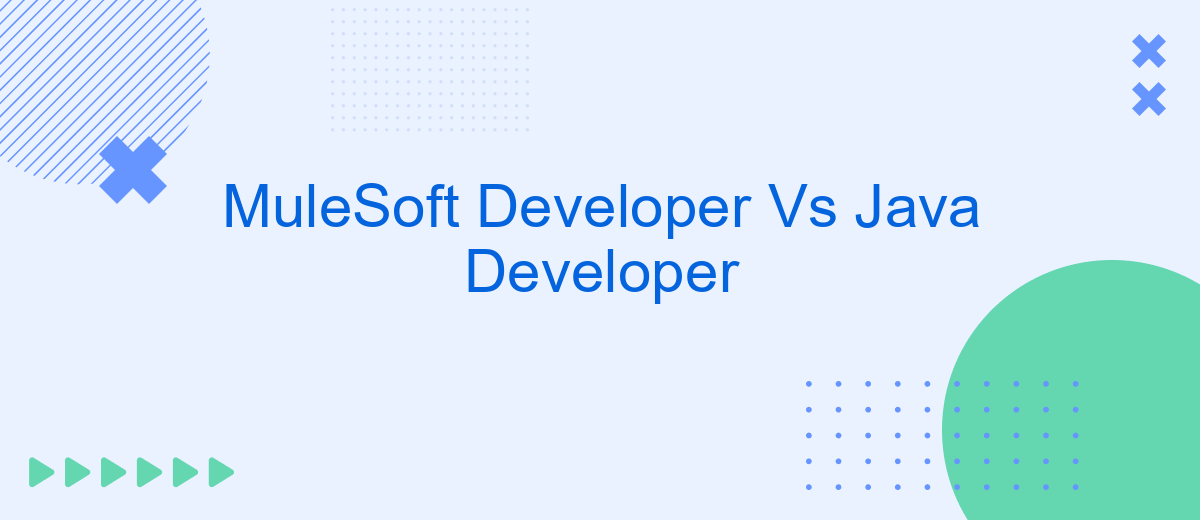In the ever-evolving landscape of software development, both MuleSoft Developers and Java Developers play crucial roles. While MuleSoft Developers specialize in integration and API management using MuleSoft's Anypoint Platform, Java Developers focus on building robust, high-performance applications using the Java programming language. This article explores the key differences, skill sets, and career opportunities for each role.
Introduction
In the rapidly evolving tech landscape, the roles of MuleSoft Developers and Java Developers have become increasingly significant. Both roles are essential in building robust, scalable, and efficient systems, but they focus on different aspects of software development. Understanding the distinctions between these two roles can help organizations make better hiring decisions and developers choose the career path that best suits their skills and interests.
- MuleSoft Developers specialize in integrating various applications, data sources, and APIs using the MuleSoft Anypoint Platform.
- Java Developers focus on creating standalone applications, web applications, and backend services using the Java programming language.
- Both roles require a strong understanding of software development principles but differ in their primary tools and methodologies.
For instance, MuleSoft Developers often work with services like SaveMyLeads to streamline integration processes, making it easier to connect different platforms and automate workflows. On the other hand, Java Developers might focus on optimizing code performance and building complex algorithms. By comparing these two roles, we can better appreciate the unique contributions each makes to the tech ecosystem.
Role Responsibilities

MuleSoft Developers are primarily responsible for designing and implementing integration solutions using the MuleSoft Anypoint Platform. Their role involves creating APIs, connecting various systems, and ensuring seamless data flow between applications. They work closely with business analysts and other stakeholders to gather requirements and translate them into technical specifications. MuleSoft Developers also monitor and optimize the performance of integrations, troubleshoot issues, and provide ongoing support. Tools like SaveMyLeads can be valuable for automating data integration processes, making their tasks more efficient and streamlined.
Java Developers, on the other hand, focus on developing and maintaining applications using the Java programming language. Their responsibilities include writing clean, efficient code, debugging and testing applications, and collaborating with other team members to develop software solutions that meet business needs. Java Developers often work on backend systems, developing server-side logic, and integrating with databases and other services. They are also responsible for ensuring the security, scalability, and performance of the applications they develop. While their primary focus is on coding, they may also be involved in system design and architecture decisions.
Technical Skills

MuleSoft Developers and Java Developers each bring a unique set of technical skills to the table, essential for their respective roles in the tech industry. While both roles require a strong foundation in programming, their specific skill sets diverge significantly.
- Proficiency in MuleSoft Anypoint Platform for designing, building, and managing APIs and integrations (MuleSoft Developer).
- Expertise in Java programming language, including frameworks such as Spring and Hibernate (Java Developer).
- Experience with integration services like SaveMyLeads to streamline data transfer processes (MuleSoft Developer).
- Knowledge of object-oriented programming principles and design patterns (Java Developer).
- Understanding of RESTful and SOAP web services (Both).
- Familiarity with DevOps tools and practices for continuous integration and deployment (Both).
- Ability to troubleshoot and optimize performance for integration solutions (MuleSoft Developer).
- Competence in database management and SQL (Java Developer).
Both MuleSoft Developers and Java Developers play crucial roles in modern software development. MuleSoft Developers focus on seamless integration and API management, leveraging tools like SaveMyLeads, while Java Developers concentrate on building robust, scalable applications using Java and related technologies. Understanding these distinct technical skills is key to appreciating the value each role brings to a project.
Career Prospects

The career prospects for MuleSoft Developers and Java Developers are promising, each offering unique opportunities and challenges. MuleSoft Developers specialize in integration solutions, connecting various systems and services to streamline business processes. With the growing demand for seamless data integration, professionals skilled in MuleSoft are highly sought after in industries like finance, healthcare, and retail.
On the other hand, Java Developers are versatile professionals who can work on a wide range of applications, from web development to enterprise-level solutions. Java remains one of the most popular programming languages, ensuring a steady demand for skilled developers across various sectors.
- High demand for integration specialists in MuleSoft
- Versatile career options for Java Developers
- Opportunities in diverse industries
- Competitive salaries and benefits
Both career paths offer robust opportunities, but the choice depends on your interest in integration versus application development. For those interested in integration, leveraging tools like SaveMyLeads can further enhance your skill set, making you a valuable asset in the job market. Whether you choose MuleSoft or Java, both fields promise rewarding and dynamic career prospects.
Conclusion
In conclusion, both MuleSoft Developers and Java Developers play crucial roles in the tech industry, each bringing unique skills and capabilities to the table. MuleSoft Developers specialize in building integrations and connecting various systems, making them indispensable in environments where seamless data flow is essential. On the other hand, Java Developers focus on creating robust and scalable applications, providing the backbone for many enterprise-level solutions.
When it comes to integrating services, tools like SaveMyLeads can significantly streamline the process for MuleSoft Developers, allowing them to set up integrations quickly and efficiently. This can free up valuable time for more complex tasks. Meanwhile, Java Developers can leverage their deep understanding of programming to customize and optimize these integrations further. Ultimately, the choice between MuleSoft and Java development depends on the specific needs of the project and the desired outcomes, but both roles are vital for driving technological innovation and efficiency.
FAQ
What are the main responsibilities of a MuleSoft Developer compared to a Java Developer?
Which skills are essential for a MuleSoft Developer that differ from a Java Developer?
Can a Java Developer transition to a MuleSoft Developer role easily?
What tools do MuleSoft Developers and Java Developers typically use?
How do MuleSoft Developers and Java Developers contribute to automation and integration in organizations?
You probably know that the speed of leads processing directly affects the conversion and customer loyalty. Do you want to receive real-time information about new orders from Facebook and Instagram in order to respond to them as quickly as possible? Use the SaveMyLeads online connector. Link your Facebook advertising account to the messenger so that employees receive notifications about new leads. Create an integration with the SMS service so that a welcome message is sent to each new customer. Adding leads to a CRM system, contacts to mailing lists, tasks to project management programs – all this and much more can be automated using SaveMyLeads. Set up integrations, get rid of routine operations and focus on the really important tasks.
